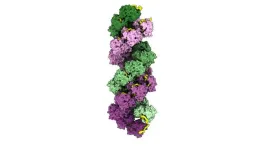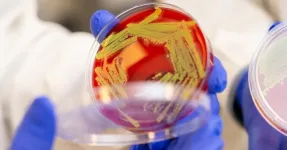(Press-News.org) A novel drug holds promise for treating Duchenne muscular dystrophy (DMD), a rare genetic disorder that causes severe muscle degeneration.
McGill University researchers have discovered that an experimental compound called K884 can boost the natural repair abilities of muscle stem cells. Current treatments can slow muscle damage, but don’t address the root problem.
DMD affects about one in 5,000 boys worldwide, often leading to wheelchair dependence by the teenage years and life-threatening complications in early adulthood.
“By strengthening muscle repair rather than just slowing degeneration, therapies that stimulate muscle stem cell function have the potential to improve quality of life for DMD patients. It may help restore muscle function and, ultimately, offer greater independence,” said senior author Natasha Chang, Assistant Professor in McGill’s Department of Biochemistry.
Building stronger muscles from stem cells
Biotechnology company Kanyr Pharma originally developed the drug for cancer and metabolic diseases, but it has not yet been approved for any specific use. This preclinical study marks the first time the drug has been tested in DMD cells.
The researchers put DMD-affected muscle stem cells from humans and mice under the microscope to see how they responded to the drug. They observed that experimental drug blocks specific enzymes, allowing muscle stem cells to develop into functional muscle tissue.
“What makes K884 particularly promising is its precision. It targets DMD-affected cells without affecting healthy muscle stem cells,” said Chang.
Unlike gene therapy, which targets specific genetic mutations and isn’t suitable for all patients, K884 works at the cellular level, restoring muscle repair regardless of the mutation causing the disease. This makes it a potential treatment option for all DMD patients, she added.
A new understanding of DMD
The findings, published in Life Science Alliance, add to a growing body of evidence that challenges previous assumptions about DMD’s root cause.
“This disease has historically been seen as a muscle problem caused by a missing protein called dystrophin,” said Chang. “But new research, including our own, shows that restoring stem cell function is just as critical for repairing muscle.”
The team plans to keep testing the drug, focusing on its safety and long-term effects, while also exploring other related compounds, some of which are already involved in early human trials.
This study was supported by the Stem Cell Network, Defeat Duchenne Canada, the Canadian Institutes of Health Research (CIHR), the Richard and Edith Strauss Canada Foundation and the Aclon Foundation.
About the study
“PTPN1/2 inhibition promotes muscle stem cell differentiation in Duchenne muscular dystrophy” by Yiyang Liu et al. was published in Life Science Alliance.
END
New drug shows promise against Duchenne muscular dystrophy
Preclinical study suggests the compound could restore lost muscle for patients with the rare degenerative disorder
2024-12-16
ELSE PRESS RELEASES FROM THIS DATE:
Influenza virus genome: finally discovered in its coat
2024-12-16
To fight the virus that causes influenza, one of the avenues being explored by scientists is the development of drugs capable of destabilising its genome, made up of eight RNA1 molecules. But the challenge is daunting: each RNA molecule is tightly bound to an assembly of proteins which creates a double helix, forming a protective coat that is difficult to manipulate.
For the first time, however, the structure of this protective mantle and its interactions with the virus' RNA have been described on an atomic scale by scientists from the CNRS2 ...
AASM advocates for permanent sleep telehealth services to enhance patient care nationwide
2024-12-16
DARIEN, IL — The American Academy of Sleep Medicine has issued a new position statement advocating for permanent telehealth coverage, emphasizing its essential role in providing high-quality, patient-centered care for individuals with sleep disorders.
The position statement, published as an accepted paper in the Journal of Clinical Sleep Medicine, comes at a crucial turning point as current telehealth flexibilities implemented by the Centers for Medicare and Medicaid Services in response to the COVID-19 public health emergency are set to expire this month. The AASM emphasizes that permanent coverage with adequate reimbursement is vital for the ...
Staphylococcus aureus thwarts vaccines by turning on a protein that halts immune response
2024-12-16
Staphylococcus aureus (S. aureus) is a major cause of skin and soft tissue infections that can sometimes lead to sepsis and toxic shock syndrome. The microbe poses a significant threat to public health, made worse by the spread of methicillin-resistant Staphylococcus aureus bacteria (MRSA) in recent years. According to The Lancet, S. aureus was associated with more than one million deaths around the globe in 2019.
“It is a pathogen in dire need of control because it causes significant morbidity and mortality not just in the United States, but worldwide,” ...
Wedel studying how transnational networks shape non-Western offshore spaces
2024-12-16
Wedel Studying How Transnational Networks Shape Non-Western Offshore Spaces
Janine Wedel, Distinguished University Professor, Schar School of Policy and Government, received money for a project on the growing non-Western offshore system used by transnational networks emanating from autocratic regimes such as Russia to skirt international checks and balances. Wedel and her colleagues are investigating these informal networks and how they enable “weaponized corruption” — the use of corruption for geopolitical ends — and the evasion of Western sanctions. They are ...
Costa and Matsumoto receive funding for hypothesis evaluation and reasoning assistant
2024-12-16
Paulo Costa, Director, C5I Center; Dept. Chair Cyber Security Engineering, College of Engineering and Computing (CEC), and Shou Matsumoto, Research Assistant Professor, C5I Center, CEC, received funding for the project: “HERA: Hypothesis Evaluation and Reasoning Assistant.”
Costa and Matsumoto are developing an explainable artificial intelligence (AI) methodology for hypothesis management and an architecture for the proposed solution. They are also supporting Interactive Aptitude, LLC, in defining use cases in one or more domains and identifying data requirements to support hypothesis management. The Mason/Interactive Aptitude team's solution ...
New research about drought impacts on wildlife can inform conservation strategies
2024-12-16
FORT COLLINS, Colo., December 11, 2024 — People around the world are dealing with drought, so it’s not shocking that it affects wildlife, too: lack of moisture contributes to habitat loss, affects how animals compete for resources, and leads to dehydration and heat stress. The surprising part? The extreme degree to which many animals may need to adapt.
New research predicts that many wildlife species in the continental United States will experience year-long droughts nearly five times as often in the coming decades (2050-2080) than they did historically (1950-2005). In an even more dramatic turn of events, three-year droughts ...
Elucidating the neural mechanisms of stress-induced cardiovascular responses
2024-12-16
Tsukuba, Japan—Under stress, animals change their behavior, such as through "fight or flight" or "freezing" response. Simultaneously, physiological responses essential for stress adaptation are triggered in the body. Cardiovascular regulation, including changes in blood pressure and heart rate, is a critical stress response.
Researchers have focused on the lateral habenula, a brain region where neurons are activated in response to stress. They investigated the neural mechanisms underlying cardiovascular responses by activating ...
Researchers discovered molecular events leading to Rett syndrome
2024-12-16
Researchers at Baylor College of Medicine, Jan and Dan Duncan Neurological Research Institute (Duncan NRI) at Texas Children’s Hospital and collaborating institutions have gained new insights into the molecular changes leading to Rett syndrome, a severe neurological disorder caused by mutations in the MeCP2 gene encoding methyl-CpG binding protein 2 (MeCP2). The team reports in the journal Neuron that loss of MeCP2 in adulthood causes immediate progressive dysregulation of hundreds of genes – some are activated while others are suppressed – and these changes occur well before any measurable deficiencies in neurological function.
The MeCP2 protein is most highly expressed ...
Anthropologists call for tracking and preservation of human artifacts on Mars
2024-12-16
LAWRENCE — Are human spacecraft, landers, rovers and other space-exploration debris little more than trash littering the surface of Mars, or the modern equivalent of Clovis points — treasured artifacts marking Homo sapiens’ lust for new frontiers?
New scholarship by University of Kansas anthropologist Justin Holcomb argues physical artifacts of human Martian exploration deserve cataloging, preservation and care in order to chronicle humanity’s first attempts at interplanetary exploration.
The ...
Daily step count and depression in adults
2024-12-16
About The Study: In this systematic review and meta-analysis of 33 observational studies involving 96,000 adults, higher daily step counts were associated with fewer depressive symptoms in cross-sectional and longitudinal studies in the general adult population. Further prospective cohort studies are needed to clarify the potential protective role of daily steps in mitigating the risk of depression during adulthood.
Corresponding Author: To contact the corresponding author, Estela Jimenez-Lopez, PhD, MPH, email estela.jimenezlopez@uclm.es.
To ...
LAST 30 PRESS RELEASES:
Justice after trauma? Race, red tape keep sexual assault victims from compensation
Columbia researchers awarded ARPA-H funding to speed diagnosis of lymphatic disorders
James R. Downing, MD, to step down as president and CEO of St. Jude Children’s Research Hospital in late 2026
A remote-controlled CAR-T for safer immunotherapy
UT College of Veterinary Medicine dean elected Fellow of the American Academy of Microbiology
AERA selects 34 exemplary scholars as 2026 Fellows
Similar kinases play distinct roles in the brain
New research takes first step toward advance warnings of space weather
Scientists unlock a massive new ‘color palette’ for biomedical research by synthesizing non-natural amino acids
Brain cells drive endurance gains after exercise
Same-day hospital discharge is safe in selected patients after TAVI
Why do people living at high altitudes have better glucose control? The answer was in plain sight
Red blood cells soak up sugar at high altitude, protecting against diabetes
A new electrolyte points to stronger, safer batteries
Environment: Atmospheric pollution directly linked to rocket re-entry
Targeted radiation therapy improves quality of life outcomes for patients with multiple brain metastases
Cardiovascular events in women with prior cervical high-grade squamous intraepithelial lesion
Transplantation and employment earnings in kidney transplant recipients
Brain organoids can be trained to solve a goal-directed task
Treatment can protect extremely premature babies from lung disease
Roberto Morandotti wins prestigious Max Born Award for pioneering research in quantum photonics
Scientists map brain's blood pressure control center
Acute coronary events registry provides insights into sex-specific differences
Bar-Ilan University and NVIDIA researchers improve AI’s ability to understand spatial instructions
New single-cell transcriptomic clock reveals intrinsic and systemic T cell aging in COVID-19 and HIV
Smaller fish and changing food webs – even where species numbers stay the same
Missed opportunity to protect pregnant women and newborns: Study shows low vaccination rates among expectant mothers in Norway against COVID-19 and influenza
Emotional memory region of aged brain is sensitive to processed foods
Neighborhood factors may lead to increased COPD-related emergency department visits, hospitalizations
Food insecurity impacts employees’ productivity
[Press-News.org] New drug shows promise against Duchenne muscular dystrophyPreclinical study suggests the compound could restore lost muscle for patients with the rare degenerative disorder


